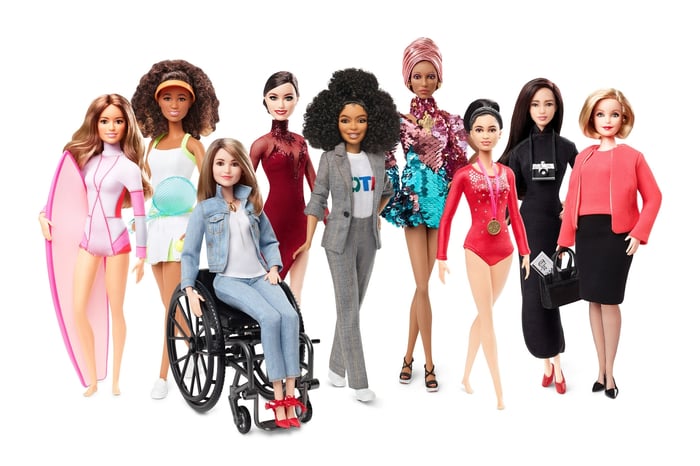Mattel (MAT 0.67%) has long held reign as the premier American toymaker, but it has lost prestige in recent years as some of its brands have gone a bit stale and it lost a big contract to produce toys under the Disney (DIS -0.45%) Princess license. Under the leadership of CEO Ynon Kreiz since April 2018, the company has been working to regain its cachet and has been making steady, incremental changes that are steering it back toward positive growth.
Some of the recent developments for Mattel are an increase in revenue and profitability, a move toward video production, and last week's announced contract with DreamWorks, a division of Comcast's (CMCSA 1.62%) Universal Pictures, to produce toys under license for the Netflix animated hit Spirit Riding Free.
Let's take a closer look at what these changes might mean for the company and its investors.

Image source: Mattel.
Stemming the losses
Mattel's 2019 fourth quarter, reported in early February, had some high notes, with sales, operating income, and gross margin beating expectations. Those numbers were still below previous quarters, but they show that the company is meeting and exceeding expectations, a move in the right direction. Full-year sales were flat at $4.5 billion, a positive change after five consecutive years of declines.
Profitability is also improving, with gross margins now sitting at 44%, an increase of 420 basis points year over year. Just before the fourth-quarter earnings release, Mattel announced several factory closures meant to lower expenses.
Market researcher NPD Group ranked Mattel the No. 1 U.S. toy company, as it has for the past 26 years. And in terms of market share, Mattel is still tops.
It could be argued that Kreiz has gotten Mattel back on solid footing. From here, he's hoping to launch the company forward, and the partnership with Dreamworks could help this along.
Losing Disney, gaining Universal
Mattel lost the Disney Princess license in 2015 to rival Hasbro, and that didn't play out too well for Mattel's sales, which were already declining. Mattel still has the contract to make toys for Disney's Pixar animation studios.
Mattel has had a relationship with Universal Pictures from long before the Disney contract ended, with the two partnering to produce several Barbie-themed productions in the early 2000s. The toymaker has also manufactured toys under license from the Hollywood studio, including the Despicable Me franchise, Monster High, and Jurassic World. The company also has licenses with other film studios.
Part of Kreiz's unique skill set is a focus on video, and one of his goals is to bring Mattel into video partnerships. Last February, within Kreiz's first year as CEO, Mattel announced that 22 animated programs were in the works based on the company's large range of characters.
This is another way Mattel is engaging in film studio partnerships to add value to his company. On Feb. 14, Netflix announced a new animated series based on Mattel's Masters of the Universe characters such as He-Man and Teela with an all-star voice lineup including Mark Hamill and Alicia Silverstone.
The newest deal is for Mattel to produce toys under license for Spirit Riding Free, a popular Netflix animated series made by DreamWorks, which also has a theatrical release planned for May 2021. The toy line will be released at the same time.
Challenges for classic toy brands
Most of the best-known classic American toy brands are made by Mattel, including Fisher-Price, Hot Wheels, and Barbie. However, these brands have seen falling sales in recent years, partially due to the popularization of licensed movie character toys and digitally enhanced toys. Kreiz is implementing what he calls a brand transformation strategy to revitalize these brands.
This is starting to take effect, with flat sales for Fisher-Price core products in the fourth quarter versus a 12% decline last year. The North American market increased 2%.
Barbie's taken a lot of heat over the years for unrealistic body proportions, and it's especially an issue in today's environment of body positivity (the decline of L Brands Victoria's Secret is a prominent example). Mattel has gotten on board with that and has made many changes to Barbie, with a more diverse range of products in terms of shape, size, and color. The brand grew 3% in the fourth quarter for the ninth consecutive quarter of growth.
The American Girl brand, a more recent addition to the toy portfolio, saw continued declines. Management is planning a more robust online strategy to invigorate the line.
Gaining steam
There does appear to be progress on all of these fronts -- lowered expenses, higher sales, and refreshed brands. Mattel won four toy-of-the-year awards, its most ever, in February 2020 for a Fisher-Price toy, a Pixar-themed toy, a Hot Wheels car, and Pictionary Air.
While the new DreamWorks deal itself won't make over Mattel, and the toys won't be out for over a year, it's another incremental step in a strategy toward overall improvement. It's definitely a stock to consider, especially as the share price has slid to a low in this down market, partially due to COVID-19 coronavirus fears.





